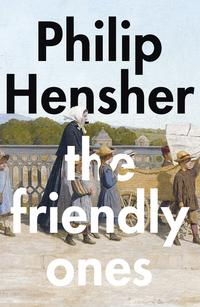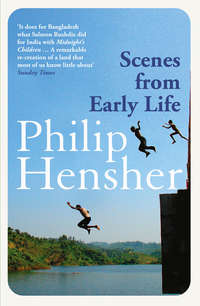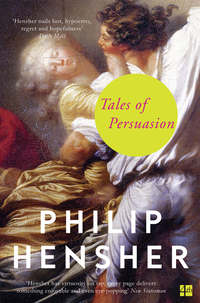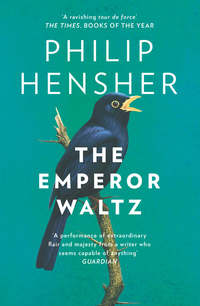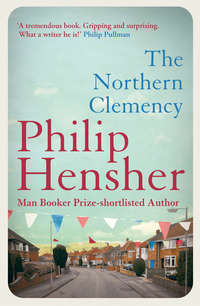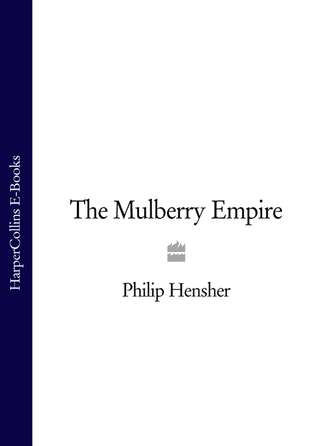
Полная версия
The Mulberry Empire
It was four in the afternoon, and Colonel Garraway was in his study, taking his second dose of opium of the day. He had unlocked the miniature walnut tantalus, and carefully measured out the drops into a glass. After twenty years establishing a good understanding with the ruby witch, each of his three daily doses was large enough to kill a neophyte. He mixed it with water from the decanter, raised it to the light and gazed at it sternly. This moment of calm contemplation, which never varied or altered, was an essential part of the Colonel’s thrice-daily renewing of his acquaintance with opium; it was his idea of a necessary self-restraint. Presently the world returned to normal. The room deliciously sagged around him, the armchair softened, rose up in an embrace, and all was well again. He never recalled, or noticed, the moment of swallowing; it passed. The Colonel smiled to himself. No, not to himself; to his books. There they were, all his little books. There they were; now, which was his favourite? There, the one with nice gold lettering, there on the spine; Dryden Dramatic Works Vol. III. That was his favourite, wasn’t it, because the I, I, I on the spine was so like three nice gold pillars. Perhaps the green stock, for this evening’s tenue, for Lady Woodcourt’s. The Regent would surely approve. But then he remembered, as a dull double knock sounded through the house and the armchair softened under him like warm toffy, that Lady Woodcourt’s had taken place a week before, he had no green stock to wear, and the Regent, now, was King – no – was dead. He settled back. The ruby witch! he thought. The ruby witch!
Elizabeth Garraway was in her room, attempting to ignore the clink and knock from her father’s study next door. It was the familiar sound of him unlocking the tantalus, taking out the miniature decanter, and settling into oblivion. She was not sure, but she rather thought what she most disapproved of in her father’s opium habit was his having had made these appurtenances, acknowledging that there was no hope or desire in him to abandon the habit. Her hair was as smooth as if it had been lacquered onto her head; her velvet dress was as rich and dark as the heart of a poppy. She continued writing her letter.
‘… I feel, however, that the weaker sex, so justly named at present, only occupies so subservient a position due to the manifest inadequacies of feminine education.’
She sighed, and thought for a moment. She was writing to her correspondent in Germany. She had had great hopes of Goethe until he died, but Herr R—, although no more effusive in his replies than one would expect of the greatest and most famous novelist in Europe, had been most encouraging. She continued.
‘If the conventional female “accomplishments” stretched to trigonometry and Greek at the expense of the watercolour sketch and the covering of screens, what changes in the helpless position of the sex in society could we hope to see!’
She looked at her sentence, quite satisfied. She wondered for a moment whether Herr R—would know what was meant by screen-covering, if that were not a usual practice of German virgins, but decided to leave it. What an honour to educate the great R—, even in so small a matter! She was brought from her thoughts by the sound of the double knock. Bella, however, was in the drawing room, she thought, and could best be left. She, turning back to her elevated correspondence, was decidedly not at home.
2.
Bella, indeed, was downstairs in the drawing room, her mind quite empty. When the double knock came at the door of the house, she was staring abstractedly at a house fly working its way across the walnut table. Her work was in her lap. The fly seemed lost, cautious, bewildered. Its huge jewelled eyes blank, it seemed to be finding its way over the polished table by touch. It leant on its feelers like an old man on a pair of sticks, as if exhausted; then, suddenly, it reached back and swiftly groomed its wings, back, head with three sleek gestures, and with a single snap, flew off on its own purposes. Bella blinked. In front of her was a young man, pink and ginger as a cake. His hat was apologetically in his hand. She did not recognize him.
‘Miss Garraway?’ the young man said. ‘I startled you. I—’
‘Mr Burnes,’ she said crisply, smiling; and, indeed, Emily had a standing instruction to admit Burnes without question, when she was not at home to all others. She had expected, however, some announcement. ‘How pleasant. Do sit down.’
‘I did call,’ he said. ‘I was unable directly to call after the evening at – at—’
‘At Lady Woodcourt’s,’ Bella said, smiling. There were, it was true, an appalling gaggle of hostesses in London, all rather like Fanny Woodcourt; Bella had spent the previous week accompanying her father to a selection of them, in the unfulfilled hope of seeing Burnes. ‘A memorable evening for you, was it, Mr Burnes?’
‘Much resembling a great many other evenings it has been my pleasure to attend in the last few months,’ Burnes said. ‘Indeed, I think I could hardly distinguish it at this distance from a dozen others this last month.’
‘What uninterrupted bliss your life must be,’ Bella said. ‘For a poor female like me, there could be no higher pleasure than a succession of evenings identical to Lady Woodcourt’s. Or perhaps you are weary of them, Mr Burnes? Surely not. Do not disappoint my youthful hopes.’
‘I confess,’ Burnes said, leaning forward in his chair as if she had a lapel to seize, ‘if I thought my life likely to consist of such evenings, I should return to Kabul and never leave again.’
‘No pleasures, then?’ Bella said. ‘None, sir?’
‘One,’ Burnes said, and the drop in his manner into a feeling seriousness was as marked as if he had fixed his gaze with hers. She leant forward, unaccountably disconcerted, and rang for tea.
‘Have you seen your friend, Mr Stokes?’ Bella said, smoothing her dress down as she settled back.
‘Mr Stokes?’ Burnes said, perplexed. He picked up a gold snuffbox, and examined it. ‘Was that the gentleman’s name?’
‘You seemed to be holding an energetic conversation with him at Lady Woodcourt’s,’ she said. ‘A bald gentleman. A writer, I believe. No – I remember now – he is the editor of a periodical. Great things were expected of him, and he wrote a novel – or did he merely promise to write a novel? It is so difficult to remember. Do you plan to write a novel, now, Mr Burnes? You are certainly promising enough to threaten one.’
Burnes took this well. ‘I fear I shall be too occupied with weightier matters shortly. My time is not entirely my own, Miss Garraway – I return to India in six weeks. Do you suppose six weeks enough time to write a three-volume novel?’
‘I feel certain that you, at any rate, possess the dash to carry through such a project. Can it be that the man who bearded the potentates of Asia in their den would shrink from the demands of sending Arabella and Rudolpho through three misunderstandings and the trial of a false suitor before reuniting them in the last pages of the third volume?’
‘Stop, Miss Garraway, I beg you,’ Burnes said, laughing. ‘I am almost moved by your tale. Perhaps it is you who should write a novel – you, after all, have a great deal more than six weeks to write your masterpiece.’
‘I hope you are not suggesting that I do not have a great number of highly important calls on my time,’ Bella said, pretending to be angry. ‘But, I assure you, I could not write such nonsense – I could not write any novel, nonsensical or no – under any motive less pressing than to save my life. By the by, Mr Burnes, you will think me remiss for not thanking you directly for the gift of your book.’
‘It was the smallest task, Miss Garraway,’ Burnes said. ‘If you enjoy it, that will be thanks enough.’
‘I have already enjoyed it,’ Bella said as the tea came in. She got up and went to the window. Outside, two girls were rolling a hoop past; a man sat in a dark gig, his horse’s nose down in a bag of oats. ‘Perhaps you are right; perhaps I have too little to do, as all my sex. Or perhaps your book was more than commonly engaging. What occupation would you advise for a poor unmarried female? My sister writes to German philosophers, but I know I should burst out laughing before I had written a page. It is a great problem, is it not – how the virgins of England shall occupy their time?’
‘I should advise them all,’ Burnes said solemnly, ‘to acquire and read my book. Then they would be transported to unfamiliar worlds of thought, I should quickly grow rich, and virtue would flow from this universal unproductive idleness.’
She answered him in the same vein, and the conversation lapsed for a moment. It was a fine spring day, almost summer in the promise of heat, and, standing there, she suddenly longed to be in the country, where her eyes could rest upon an expanse of green from her father’s house, where there was some relief greater than the Park and the small dusty square of green called Hanover Square, where dogs panted as if in the remotest desert.
She was lost in thought for a moment, and Burnes startled her by saying, ‘When do you go to the country, Miss Garraway?’
He might have been following her thoughts, although it was not an unnatural thing to ask in May, in London. ‘I imagine shortly after your departure, Mr Burnes. I doubt you could have found anything more queer on your travels than our house in Gloucestershire. It is truly something to make a Sultan stare. A moat, castellations, a swarm of savage peacocks, and everything inside so higgledy-piggledy. It is picturesque, as my sister says, to the point of shame.’
‘I’m sure that I should love it very much,’ Burnes said, now entirely serious.
‘Yes,’ she said, having nothing contrary to say. ‘Yes, I think I love it too. Tell me, which of your oriental potentates did you find the most agreeable? From your book, they all seem equally amiable, or almost all.’
Burnes drew his chair a little closer to hers, set down his teacup. A light film of sweat was dewing his forehead; it must now be warm in the street. ‘On the whole,’ he said. ‘I think Dost Mohammed, the Prince of Kabul.’
‘The Prince of Kabul,’ Bella breathed, turning to him with her luminous grey eyes. ‘How I envy you, to number such a tremendous personage among your acquaintance. The Prince of Kabul – it truly sounds like the black villain in a Christmas raree show. I see him, entering, stage left, his face and his intentions for the heroine both as black as pitch. Forgive me, Mr Burnes – I let my tongue run on to no purpose, and I recall now how kind the gentleman was to you from my reading of your book. And now here is my sister.’
3.
Bella, with relief, rose as her sister came in, gliding as ever, a ready smile on her face. The gliding was a characteristic of Elizabeth. She moved without any impediment to her path, as if, in the kindest possible way, any impediment which did not rapidly remove itself would be crushed beneath the wheels of this mildly smiling female Juggernauth. She was twenty, and, on the whole, got her own way with anyone from Goethe to the stillroom maid. Bella presented them.
‘How dull you must find London, Mr Burnes, after all your exciting travels.’
‘On the contrary, Miss Garraway,’ Burnes said. ‘I have met far more interesting and engaging people in London and, since the greater part of my travels was spent in great discomfort, thirsty and hungry and subject to a succession of trivial ailments, I am glad to exchange the romance of desert life for the unremarkable comforts of Park Lane.’
‘But surely, Mr Burnes,’ Elizabeth continued, ‘you must find London talk tiresomely dull after the company of your Indian nabobs and Emirs. After the barbaric court of a Maharajah, what possible entertainment can there be for you in an English lady’s drawing room?’
Elizabeth was refusing to sit down, the better to clasp her hands and strike minor attitudes against the chimney breast. It was all very well, but Burnes, hat in hand, was beginning to look somewhat awkward standing there, like a footman awaiting his mistress’s pleasure. Bella merely looked amused.
‘To be frank,’ Burnes said, ‘so few of your Eastern princes have anything of interest to say.’
‘That cannot be true, Mr Burnes,’ Bella said. ‘Why, your book is full of interesting and extraordinary remarks passed by the princes you met. I do not believe you could write such an interesting book filled with the remarks of the ladies of London society.’
‘To be sure,’ Burnes said, subsiding with relief as Elizabeth finally sat down at the pianoforte, ‘their conversation seems extraordinary and full of fascination to us, who have only an imperfect knowledge of their culture, just as the meanest building put up in the Orient seems wonderful to us, as our eyes are not accustomed to what is commonplace.’
‘The meanest building of the Orient – the garden huts of Bokhara – a tremendous notion, sir,’ Bella said as Elizabeth started on one of Field’s nocturnes, not at all softly.
‘There are exceptions to what I say,’ Burnes said over the intensely genteel din. ‘As I was saying before Miss Elizabeth Garraway came in—’ gracious nod ‘—I found Dost Mohammed, the Prince of Kabul, to be a remarkable man.’
‘I have not quite – reached as far as – him in my – perusal of your – book,’ Elizabeth said, in little gasps between Field’s trickier ornamental flourishes; both she and the music seemed to hiccough.
‘How did he immediately strike you, Mr Burnes?’ Bella said.
‘He has very bad teeth,’ Burnes said, smiling warmly and incidentally displaying his own very good ones, the fruits of a Scottish childhood eating nothing but roots and thistles. ‘His conversation is curiously intelligent and penetrating when he asks about us – I felt often that, after my visit, he must surely know far more about the British than this Briton, at least, had succeeded in discovering about him. But in the main, it is a curious, intangible, indefinable quality he has which makes him so remarkable. Do you know what I mean by charm?’
‘Of course,’ Bella said. ‘I am surprised to hear a Scotsman refer to it. I had thought it a strange and infrequent visitor to your nation. I know from the immortal Kant that properties and qualities may flourish without being named, but this is the first I have heard of the word being used without anything to attach it to. But I forgot, Mr Burnes, you have spent long in London, and Kabul, where they know, no doubt, all there is to be known of charm.’
Even Bella feared this raillery might have gone too far, but Burnes seemed to take it in good part, merely replying, ‘I would never have thought from your appearance, Miss Garraway, that you had read the immortal Kant.’
‘Naturally not,’ Bella said. ‘I hear most of it from my sister, who is the great reader among us, and that seems to suffice for the normal demands of a lady’s conversation.’
Elizabeth came to the end of her nocturne with a gulpingly hammered series of chords, and rose to the sincere thanks of Burnes, before excusing herself to the necessity of her correspondence. Burnes got up to take his leave, but before he could speak, Elizabeth had shot through the door and was halfway up the stairs; it was her ostentatiously tactful manner, which never failed to embarrass Bella and make her unable to say anything. She stood there, with Burnes, smiling. Elizabeth had gone, he was alone with her sister; and yet nothing so very terrible seemed to have happened.
‘Mr Burnes,’ Bella said. It sounded facetious, mocking, said like that, and though she had nothing she wanted to say to him, it would be foolish now to sit down again. She recollected herself. ‘I am so pleased you came. There must be so many calls on your time, I know.’
‘I am so sorry I was unable to call before today,’ he said softly, and that was not quite what she meant.
‘We—’ Bella stopped. ‘I am pleased you came at all. Do come again, any time. Truly, any time you can spare from your valuable six weeks.’
He bowed, and since his lovely eyes would not quite meet hers, she felt assured that she had now said too much. She could see their next meeting now, in her head; they would be in a crowded room, he surrounded by duchesses, ministers, talking – he had now acquired an emblematical significance – to Stokes the writer and all that shining entourage. And a chill would have fallen between the two of them like a curtain, as he bowed with all the unfeeling profundity at his disposal.
She was so lost in her thoughts that when Burnes, looking mildly puzzled, took his leave and went, she hardly noticed that she was quite alone in the drawing room.
4.
‘Truly, I like him,’ she said later, to Elizabeth, upstairs, after dinner.
Elizabeth left off brushing Bella’s hair, and turned to her own. It was an unspoken annoyance to Bella that her sister, who was apt to embarrass when strangers were present, and spouted nonsense by the square yard when in correspondence with German philosophers, was perfectly rational and sympathetic alone, after dinner, with no servants listening.
‘He seems admirable,’ she said. ‘But you say he leaves in six weeks.’
‘Yes, he does.’
‘And when does he return?’
‘He hasn’t named a date. I doubt he knows. But truly, I like him.’
Elizabeth pulled at her hair, dragging it in front of her face like a veil, and through it made a vulgar noise with her tongue and lips. Bella shrieked, falling back onto her bed in giggles. ‘Truly,’ Elizabeth said. ‘I like him.’
‘I do.’
‘Well, when he returns, perhaps you will still like him. Fancy – Bella Garraway to wait ten years for her betrothed, and he comes back, unable to remember the name of this suddenly old woman, or in a box, a sad early death, dead of the cholera – remember, Bella, George Hathersage, dead after five weeks in Calcutta, dead at twenty-four. Or – fancy, picture, you at the docks, waiting, expectancy bright in your wrinkled old face, and off steps Mr Burnes, the hero of the age, his left arm firmly linked to a Maharajah’s daughter and his right clinging to a case of her family’s diamonds.’
‘If it comes to that,’ Bella said. ‘We have diamonds, too.’
‘But Bella, it may be years – do think.’
‘It doesn’t signify, Elizabeth. I am quite sure he will not call again. Don’t ask me how I can be so sure, but I am sure.’
But he did call; the next day, and the day after that, and the day after that. He came and he sat, and he submitted to being teased and quizzed until Bella was blue in the face. Always they laughed together – it was a strange sound, in that house, so very genteel – and always they were at ease with each other. The second time Burnes came, he was admitted at once to the empty drawing room, and asked to wait while Miss Bella was sent for. He thought Miss Bella was at home, the footman did – couldn’t answer, he was sure, for the remainder of the family. Burnes nodded, satisfied. He looked around him, at the dark quiet room which could be anyone’s, and, bearing no trace of her, was Bella’s. He wondered where in this abandoned corner of Hanover Square she had left her mark, and the ticking of his watch was loud against the back of his hand. There was a rude rumpus from upstairs; it made him jump. He could have sworn it was the noise of a girl jumping down the stairs, two at a time, and accompanying herself by singing, the sort of unobserved raucous singing he would never have imagined her capable of. The tune was ‘Men of Harlech’, but Burnes, hat and gloves in hand, grew pale as he heard the words Bella, unobserved, as she clearly thought, was applying to the familiar regimental favourite.
I’m the man (thud!) who came from Scotland Shooting (thud!) peas up a nanny-goat’s bottom (thud!) I’m the man who (thud!) came from Scotland Shooting—
With that, she burst incontinently into the silent drawing room, and from the momentary alarmed look on her face, all was clear to Burnes. The footman had failed to find Bella. She had leapt downstairs to the accompaniment of the childhood favourite, believing herself to be alone in the house. Burnes, however, was equal to the situation.
‘On the contrary,’ he said with his best Montrose brogue, ‘I’m the man who came from Scotland.’
After that, they were, so to speak, on all fours with each other, and the casual observer of Mr Burnes’s near-daily calls in Hanover Square might well have been surprised to see the great explorer demonstrating the distinction between the Afghan turban and that of the faithless Sikhs, with the doubtful aid of the drawing room curtains, while the accomplished, beautiful and respectable Bella Garraway lay supine with laughter on the sofa.
‘Truly, I like him.’ That was all she said to her family, and it was her useful formula. She resisted all suggestions that he should come to dinner, and was not pressed. Colonel Garraway’s state made the hosting of a dinner a problematic proposal, and, for her part, Bella could only contemplate the idea of observing Burnes across a plate of soup with a tremor of amusement, when he had spent the previous afternoon teaching her to imitate the precise noise a Bactrian camel makes before spitting.
Only sometimes he fell silent in her company, seemed sadly lost in thought as his eyes fixed on the wallpaper, and she knew quite well what he was thinking, what in all honesty he felt he should now say. If, however, he did come to the point of looking at her and saying, ‘Bella, I am poor,’ she knew, for once, what she would say in return; she would say, quite simply, ‘Burnes, I am rich,’ and there would be an end on it. Or a beginning; one of the two. But of course he never did say it, having no tongue with which to say such a thing. The truth, unspoken, hung like a curtain between them, and it was, it seemed, only Bella who understood that if he chose, he could take that curtain and wind it, absurdly, about his head, and reduce her, as always, to the point of laughter.
‘Truly, I like him,’ she said, and truly, she did.
‘Must you go?’ she said. It was late in the afternoon in Hanover Square, and Burnes was standing to leave.
‘I must, Bella,’ he said, but he was smiling, and she knew it meant nothing, and let him go. She shut her eyes, and hugged herself, and smiled, and stayed where she was. She stayed where he had left her, just for a moment, trembling, taut, unseen, like a harp string when the door has been closed on an empty room. She stayed there with her eyes closed until she heard the door to the house close behind him. She opened her eyes on the empty room, and moved swiftly to the window – to the side of the window, where she would be in shadow, and watched him trot down the steps to the house. She saw how gracefully he moved. He must, she thought, be a fine dancer. And then, with an erotic force which made her blush for the weakness of her first thought, she realized from the grace of his few quick movements down the steps in Hanover Square, what he must be good at. What he must be best at. He, surely, was a horseman of superlative accomplishment.
Burnes stopped on the last of the steps, and seemed to realize something. He stood, and began to cast a glance back at the solidly-shut door of the Garraways’ house. He hovered there for a moment, while Bella watched, puzzled, and then thrust his hands into his coat-tails, and strode off with a pretence of purpose.
When Bella turned round, Emily was in the room. Instead of removing the tea-things, she was hovering over the sofa.
‘The gentleman—’ she said, almost nervously.
‘Yes, Emily?’ Bella said, turning back to the sight, once so ordinary, of Hanover Square without an Alexander Burnes in it. ‘Yes, what is it?’
‘The gentleman forgot his gloves, miss,’ Emily said. She was holding up a pair of pale blue gloves. That was what it had been; Burnes had left his gloves there, and only realized once he had left the house. Casting a glance back at the door of the Garraways’ house, he had found that too difficult a challenge; the man who had confronted the Amirs of Bokhara now, apparently, had found some timidity in him which made him shrink from returning to claim his gloves.


